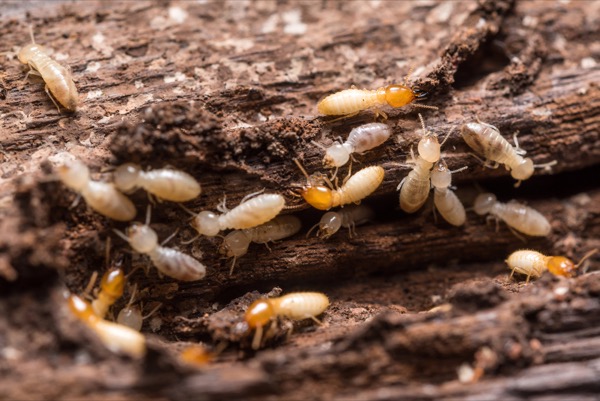Affordable Ant Control Solutions: Keep Your Space Ant-Free
Affordable Ant Control Solutions: Keep Your Space Ant-Free
Blog Article
Ecological Impact of Parasite Control: Harmonizing Efficiency With Sustainability
The ecological effect of insect control is an essential concern that calls for a fragile equilibrium between attaining effectiveness in taking care of bugs and ensuring sustainability of our ecological communities. As we aim to shield our plants, homes, and health from the dangers positioned by insects, the approaches we use can accidentally damage the environment. From the usage of dangerous chemicals that permeate into our dirt and water to the unexpected consequences on non-target varieties, the consequences of standard pest control methods are significant. However, there are arising methods that supply wish for a much more lasting strategy to pest management. These options not only aim to resolve the immediate pest troubles however likewise take into consideration the long-term health of our earth.
Dangerous Chemicals in Bug Control
The application of dangerous chemicals in parasite control positions substantial environmental and health threats that necessitate mindful consideration and mitigation strategies. Pesticides, chemicals, and herbicides are generally used to get rid of bugs, but their widespread application can bring about unexpected effects. These chemicals can infect soil, water sources, and the air, affecting not just the targeted parasites yet additionally helpful pests, wild animals, and people.

To address these risks, incorporated parasite monitoring (IPM) techniques are being promoted as an extra lasting option. IPM involves a mix of methods such as organic control, environment adjustment, and the targeted use of pesticides as a last resort (ant control high point nc). By taking on a holistic approach to pest control, we can decrease the environmental and health effects related to harmful chemicals while properly taking care of pest populations
Effect On Non-Target Types
Taking into consideration the unintended consequences of parasite control methods, the effect on non-target species is a crucial element that needs extensive evaluation. While parasite control procedures intend to target certain insects, various other organisms in the ecological community may be inadvertently impacted. Non-target types, including valuable insects, birds, animals, and even plants, can endure indirect or direct harm from pesticide applications or biological control methods.
Pesticides designed to deal with a specific bug parasite might damage pollinators like or all-natural killers such as ladybugs. Organic control representatives, if not species-specific, can pose threats to unintended targets, disrupting the ecological balance.
To reduce the effect on non-target types, integrated insect administration (IPM) techniques that stress an all natural strategy to pest control are advised. These approaches focus on the usage of eco-friendly techniques, lessening damage to helpful organisms while successfully managing pest populations. Conducting extensive danger analyses and keeping track of the outcomes of pest control initiatives are crucial action in guarding non-target species and advertising general ecosystem wellness.
Dirt and Water Contamination
Unexpected ecological repercussions of insect control methods expand beyond impacting non-target species, with considerable ramifications for soil and water contamination. Pesticides, herbicides, and chemical plant foods utilized in insect control can seep into the dirt and pollute groundwater, positioning a threat to both water and terrestrial ecosystems. Dirt contamination can disrupt the equilibrium of bacteria essential for nutrient biking and plant growth, causing decreased dirt fertility and performance. Additionally, these chemicals can persist in the setting for extended periods, accumulating in the soil and potentially getting in the food chain.
Water contamination is one more essential issue connected with bug control techniques. Overflow from farming areas treated ant control kannapolis nc with chemicals can lug these chemicals into nearby water bodies, impacting water microorganisms and water top quality. Impurities in water sources can have far-reaching repercussions, affecting not only marine life yet additionally human wellness through the consumption of contaminated water or aquatic organisms. To mitigate soil and water contamination from bug control tasks, incorporated bug administration approaches that focus on sustainability and reduce chemical inputs are critical.
Air Air Pollution From Chemical Use
Exposure to airborne chemicals throughout farming applications positions a substantial issue for air pollution control steps. Additionally, chemical drift, where chemicals are brought by the wind to unexpected locations, can lead to the contamination of nearby ecological communities and water bodies.

Approaches for Sustainable Insect Control
In the world of farming techniques, implementing sustainable pest control methods is paramount for preserving environmental equilibrium and safeguarding crop yields. Sustainable bug control highlights making use of eco-friendly methods to manage insect populations properly while reducing injury to non-target organisms and communities. Integrated Bug Administration (IPM) is an extensively taken on strategy that incorporates organic, social, physical, and chemical control approaches to attain lasting parasite monitoring remedies.
Crop turning and diversification are additionally efficient techniques to interfere with pest life cycles and produce less desirable conditions for pests to prosper. Ultimately, by incorporating these lasting insect control techniques, farmers can attain a balance in between pest management efficiency and environmental stewardship.
Conclusion
To conclude, the environmental effect of parasite control techniques need to be meticulously thought about to stabilize efficiency with sustainability. Harmful chemicals used in bug control can bring about dirt and water contamination, air pollution, and injury non-target species - termite control services. It is essential to carry out sustainable parasite control approaches to decrease these unfavorable effects on the environment and promote a healthier environment for future generations
By embracing a holistic approach to pest control, we can decrease the ecological and health and wellness effects associated with harmful chemicals while efficiently handling pest populaces.
To minimize the air pollution caused by chemical use, it is vital to take on integrated bug administration techniques that focus on the use of non-chemical pest control approaches, such as plant turning, all-natural killers, and resistant plant varieties. Lasting bug control stresses the usage of ecologically pleasant approaches to manage parasite populaces properly while reducing damage to non-target microorganisms and ecological communities. Integrated Insect Administration (IPM) is an extensively adopted technique that incorporates organic, social, physical, and chemical control techniques to accomplish long-lasting insect administration services.
Report this page